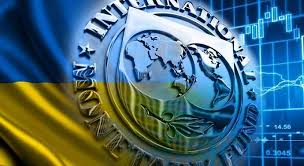
The International Monetary Fund (IMF) has clarified the forecast of Ukraine’s GDP growth in 2024 under the World Economic Outlook (WEO): it expects it at the level of 3.2%, then during the third revision of the EFF Extended Fund Facility program in March estimated it in the range of 3-4%.
According to a publication on the Fund’s website on Tuesday, the economic growth forecast for 2025 was kept at 6.5%, up from 5.3% in 2023, according to the State Statistics Service.
The IMF also expects average annual inflation to slow to 6.4% this year from 12.9% last year and accelerate slightly to 7.6% in 2025.
Ukraine’s current account deficit forecast for this year and next year has been kept at the same level as in the third revision of the EFF program – 5.7% of GDP and 8.2% of GDP after 5.5% of GDP last year.
The Fund also reiterated expectations for unemployment to fall from 19.1% last year to 14.5% this year and 13.8% next year/
The IMF indicated that it forecast growth in the euro zone to accelerate to 0.8% this year and 1.5% next year after 0.4% last year, driven by the strong impact of Russia’s war against Ukraine.
“Stronger household consumption as the impact of the energy price shock fades and lower inflation supports real income growth is expected to support the recovery,” the Fund said, clarifying that the updated estimate is 0.1-0.2 percentage points (p.p.) worse than the previous estimate made in January.
Overall, the WEO said global economic growth, estimated at 3.2% in 2023, will continue at the same pace in 2024 and 2025. The forecast for 2024 is revised upward by 0.1pc from the January estimate.
“These growth rates are low by historical standards, driven by both short-term factors, such as continued high borrowing costs and the withdrawal of fiscal support, and the longer-term effects of the COVID-19 pandemic and Russia’s invasion of Ukraine, weak productivity growth, and increased geoeconomic fragmentation,” the IMF said.
Overall global inflation is expected to decline from an annual average of 6.8% in 2023 to 5.9% in 2024 and 4.5% in 2025, with advanced economies returning to their inflation targets sooner than emerging market and developing countries.
The report also notes that the forecast for global economic growth in five years’ time (at 3.1%) is the lowest in decades. ” An alarming change is the widening gap between many low-income countries and the rest of the world. The growth forecast for these economies has been revised downward and the inflation forecast has been raised,” the Fund states.
Worse still, the report notes that compared to most other regions, estimates of long-term damage for low-income developing countries, including some large countries, are revised upward, indicating that the poorest countries are still unable to recover from the pandemic and cost-of-living crisis.
Its experts attribute the relatively weak medium-term outlook to lower GDP per capita growth, due in part to persistent structural frictions preventing the movement of capital and labor to productive firms. And worsening growth prospects in China and other large emerging market economies, given their growing share in the global economy, will have a negative impact on the development prospects of their trading partners.
According to the IMF, the risks to the global economic outlook are currently balanced. “On the downside, new price spikes triggered by geopolitical tensions, including from the war in Ukraine and the conflict in Gaza and Israel, could, along with the resilience of core inflation while labor markets remain tight, lead to higher interest rate expectations and lower asset prices,” the WEO pointed out.
The fund added that geo-economic fragmentation could intensify, with higher barriers to the flow of goods, capital and people implying slower economic growth due to lower supply.
At the same time, it noted that artificial intelligence and stronger structural reforms than expected could boost productivity growth.
As the global economy approaches a soft landing, the priority for central banks in the short term is to ensure that inflation falls smoothly, avoiding both premature policy easing and excessive delay leading to lagging behind targets, the IMF also said.
“Multilateral cooperation is needed to limit the costs and risks associated with geoeconomic fragmentation and climate change, accelerate the transition to green energy, and facilitate debt restructuring,” the Fund concluded.
More details on macroeconomic indicators of Ukraine and the world, GDP of major countries and other economic topics were discussed in one of the video analysis of Experts club analytical center – https://youtu.be/w5fF_GYyrIc?si=Ymo-FlMFNGfLLdK-.
Subscribe to Experts club channel here: https://www.youtube.com/@ExpertsClub
EXPERTS CLUB, GDP GROWTH, IMF, MACROECONOMICS, UKRAINE, URAKIN